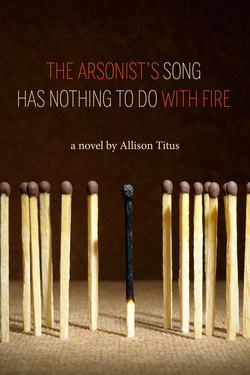Читать книгу The Arsonist's Song Has Nothing to Do With Fire - Allison Titus - Страница 19
На сайте Литреса книга снята с продажи.
ОглавлениеIt started with an average procedure. Vivian had a French professor and the French professor had a sister; the sister was having throat surgery and would be a l’hopital pour une semaine. Vivian had an ear for almost silent endings. A week became a month. A minor complication; another surgery. The month lingered. Vivian tried not to think of the body and all its soft organs but she did what she could: watered the plants, sorted bills, fed the fish. House one: single-family condo, well maintained.
Posted at the local video rental place was a flier: parents seeking a house sitter while they moved their son out west, References From The College Required. The Douglas family—dried eucalyptus wreaths on every window, a damp basement, a freezer full of low-sodium TV dinners. Vivian watched game show reruns and flipped through albums of old family photographs, page after page of weddings and birthdays. Yellow dresses, yellow cakes. House two: split-level, two-bedroom, detached garage.
One week in July: a friend of a friend’s cousin, just married. The newlyweds were going on holiday and Vivian had nowhere else to be. She took in the paper, smuggled whiskey from the bar. The cousin’s name was Kitty. Music from the strip mall’s Mexican restaurant accessorized the neighborhood all night, like colored lights strung on Christmas trees—tinny and cheerful and relentless. House three: suburban ranch, wall-to-wall carpet, beige.
House after house after apartment. Bedrooms and kitchens and back doors and deadbolts. How similar they became, all the different rooms in all the different towns, each one as familiar as it was strange. Every oversized breadbox. Every welcome mat. All the guitar cases in all the closets stashing ordinary porn.
When she ran out of houses, the worst were nights spent in the bus station, so when it came down to that, she did what she could. And breaking in was easy. Mail piled up near the door, lights automatic at dusk, curtains never drawn—chances were the house was empty. She cased neighborhoods that way, kept track of where she might go next, religiously considered her alternatives.
This was how people lived: they left keys under their flowerpots, taped them inside their mailboxes, snapped magnetic boxes inside the wheel wells of their cars. They left windows unlocked like they were leaving instructions. Here, the bar’s not soldered. Slide it out and the window practically opens itself. Here, the deadbolt sticks so be sure to pull forward then turn.
The first time, it was winter. The back door was unlocked; she held her breath and counted by twos to a hundred, a nervous habit. She stayed three days. Slept on the couch, left the lights off in the afternoon, drank water straight from the tap. She took a Polaroid of the kitchen: a sick argyle of green and yellow tiles, rotting pears on the table. She couldn’t say she wasn’t nervous. The second time was a year later. An ex-boyfriend’s house. She meant to stay for the entire Memorial Day weekend. The family had a wedding to attend in Connecticut; Vivian had backed out of the trip months before. She knew where the spare key was kept, which brick was loose behind the shed. She’d spent Thanksgiving with Mason’s family—his parents, his brothers, their wives, his younger sister—but hadn’t been back since. They’d been so nice. She hated it. She wasn’t in love with Mason and it didn’t seem fair, all that warmth. All that generosity made her sick to her stomach. All the ways she wasn’t gracious.
The afternoon of the wedding, Vivian wandered in and out of rooms, taking photographs from the thresholds. When she’d used up the roll, she mostly sat at the dining room table and thought about that holiday. Sometimes she wished she could go back. Sometimes she missed how Mason’s fingers stung her everywhere he touched, from the softest, untoned parts of her inner thighs to her wrists.
By evening, she gave up. She’d miscalculated how full of regret grief could make you, even if the grief had more to do with abstract longing than desire for a particular thing. She hadn’t been in love with Mason, but she had wanted to be in love with him, and that meant she couldn’t stay there like a stranger, which was the only way she allowed herself to stay anywhere. The only rule she had. She left the house as soon as it turned dark. Slid the brick in place and walked all the way to the bus station.
